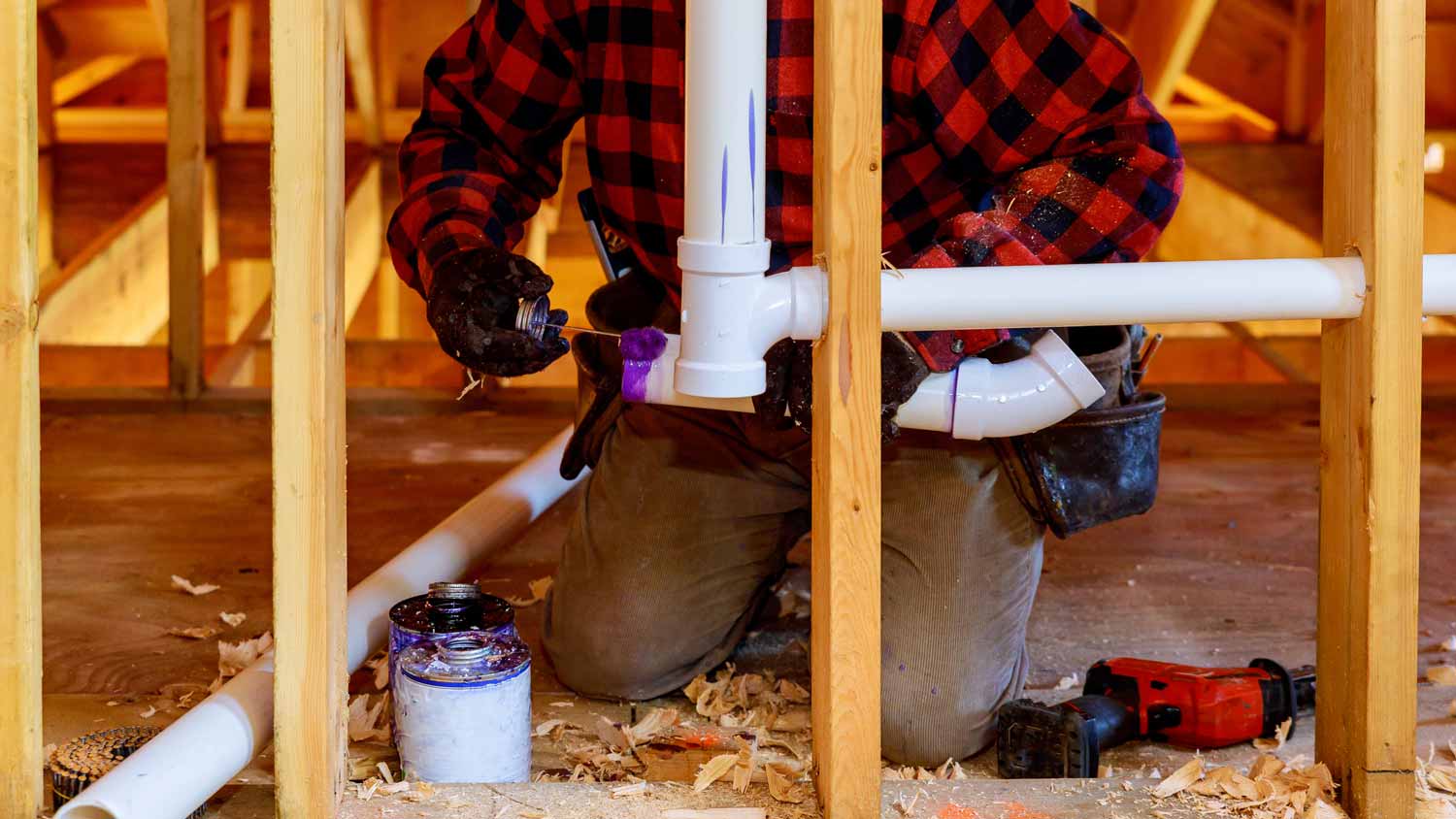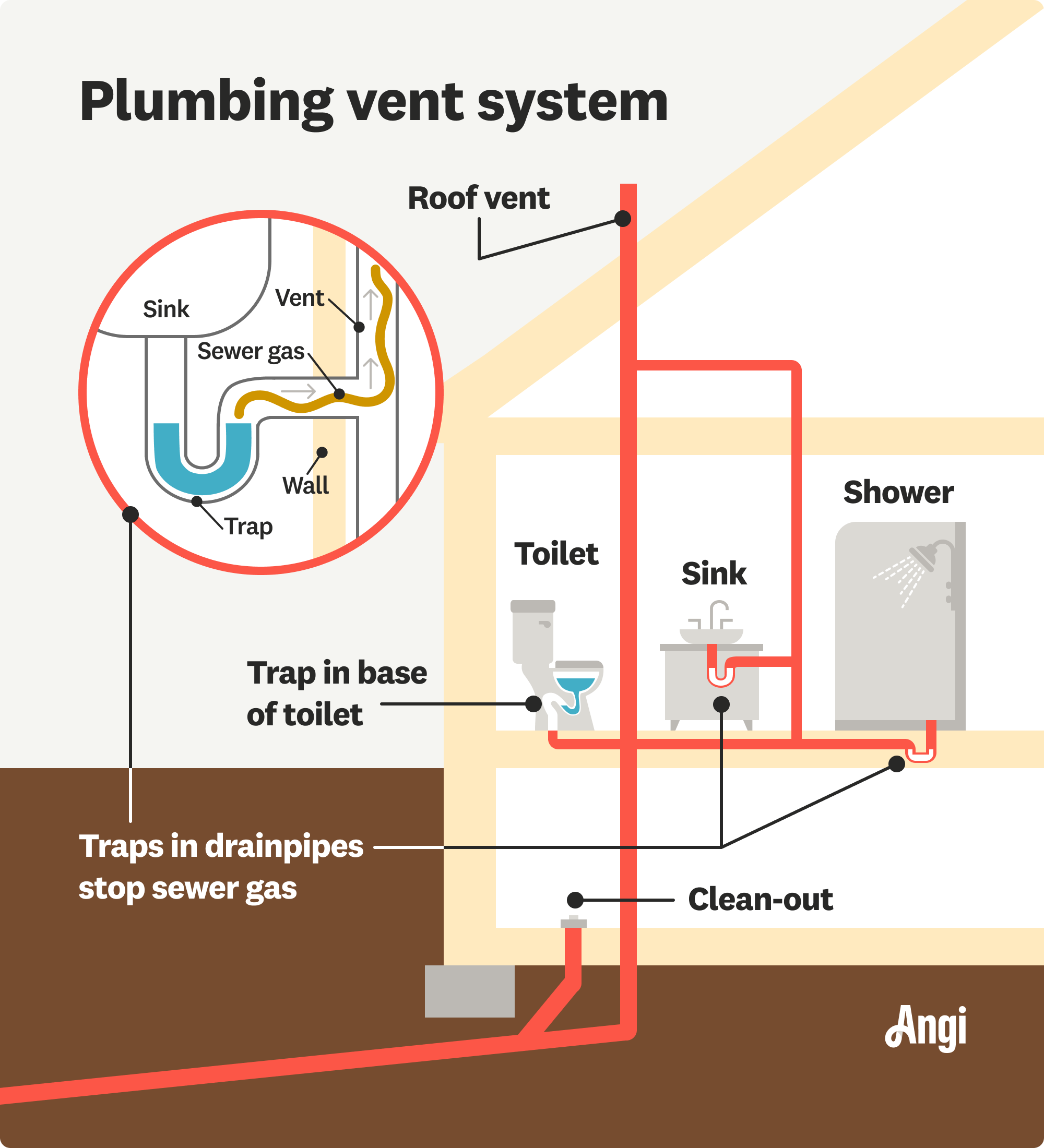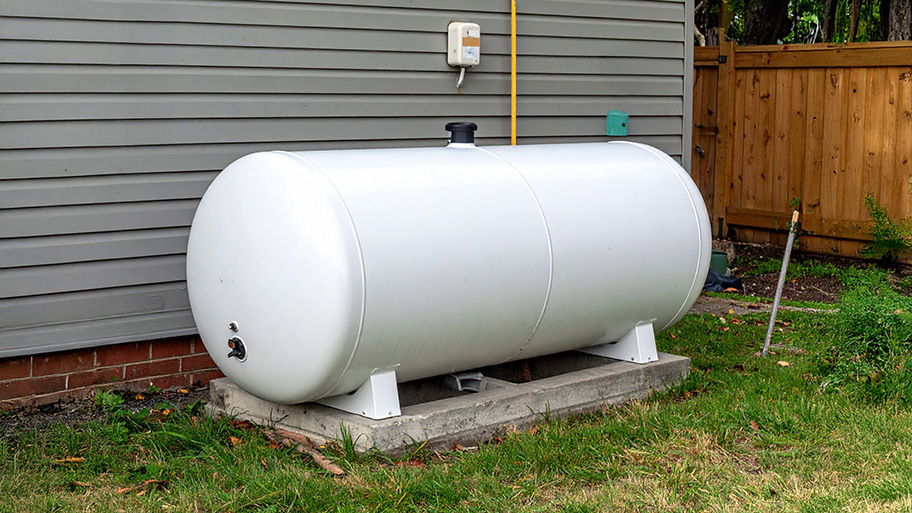
Worried about water leaking around your toilet? You may have a faulty toilet flange. Learn more about the cost to replace a toilet flange in our guide.
Plumbing costs depend on your project and location. Check with a local pro for your specific job.
You should hire a licensed plumber to reroute a plumbing vent, with labor costs between $45 and $200 per hour.
Rerouting vent pipes often comes with some remodeling requirements: Hole repair can cost between $400 and $900, while roof pipe work costs around $1,000.
Most piping costs around $1 per foot, although copper piping will be more expensive at $3 per foot.
If a permit is needed for the plumbing project, especially if roofing work is involved, expect to add $50 to $500 to the bill.
Vent pipe replacement costs $1,500 on average, though it can range from as little as $500 to as much as $5,000. The piping of a household is a modern miracle, as it utilizes the air flowing throughout the house at any given time to keep your lines moving. A plumbing vent pipe helps keep this process going by maintaining the air pressure throughout the pipes. But if you’re remodeling a bathroom, repiping a home, or even moving a wall, you may need to reroute your plumbing vent. Learn all the factors that contribute to vent pipe replacement costs.
The total cost of rerouting a plumbing vent depends on the materials used, any repairs you’ll need after the move, and overall labor costs.
There are two types of professionals you can hire to tackle this job, either a plumber or a handyperson. Hiring a local licensed plumber will cost anywhere from $45 to $200 per hour. This ensures the job is bonded and warrantied, but you may need to hire a handyperson anyway if there's drywall damage. Contact at least three plumbers for quotes so you can get the best price possible.
The average hourly cost of a handyperson is about $40 to $140 per hour if you choose to opt for a handyperson to take on this project. Not all handypersons are licensed, so warranties on work are not guaranteed. But you wouldn’t likely have to hire someone else to tackle the repairs needed to complete the job.
Shaddai Plumbing team is great! They are very professional, they keep their word, they complete job without delays. Great quality. We had to replace old water pipes across 2-story home and their service was great. We asked to add additional water switches to be able to switch hot/cold water on and off in separate parts of home - and they did it. Now if it will be leak or other problem - we can switch off kitchen area, or second floor without impacting other parts of our home. Highly recommended!
| Repair Types | Cost |
|---|---|
| Hole repair | $300–$900 |
| Roof pipe rerouting | $1,070 |
| Flooring repairs | $200–$600 |
Repairs may be needed if rerouting the pipes means cutting into the floor, roof, or walls. The cost to repair holes in drywall can range anywhere from $300 to $900 or more, depending on the size and severity of the holes. Hiring a handyperson to reroute the plumbing vent may mean that the drywall repair price is included in the project, rather than coming in separately.
If you’re rerouting your plumbing vent pipe on your roof, then you can expect to pay around $1,070 on average for roofing repairs. Patching up a roof requires more material to ensure Mother Nature doesn’t make a surprise visit to your living room one day.
Floor repairs will come down to the flooring material you currently have. The average cost of flooring repairs is around $400 but can range from $200 to $600.

Simple projects that only require a small PVC pipe, a little cement, and a cap will cost significantly less than a larger scope project. Small projects include rerouting an easily accessible plumbing vent underneath a sink or in a basement.
More extensive projects, such as rerouting a plumbing vent to exhaust in a different location of the home, will cause a significant price hike. This type of project includes the cost of drywall repair, roof repair, and much larger amounts of piping.
| Materials | Average Cost |
|---|---|
| CPVC piping | $1 per linear foot |
| Pex piping | $1.15 per linear foot |
| Copper piping | $3 per linear foot |
| Primer | $10–$20 per gallon |
| Cement | $20–$30 per gallon |
| Flux | $5–$15 per 8 oz. |
| Solder | $20–$35 per 8 oz. |
Doing work on the roof may require a building permit. You should ask your local municipality if this is necessary, as it varies from city to city. Minor building permits for this type of project cost anywhere from $50 to $500 on average.

Hiring a local plumber costs $45 to $200 per hour, but it’s not a cost to skimp out on. Replacing a vent pipe is a complex task that requires specialized knowledge, and mistakes can lead to costly repairs or health and injury hazards.
Always hire a professional plumber to do plumbing work in your home, but it’s particularly important for vent pipe replacement. Here’s why:
Improper vent pipe replacement can lead to sewage backups, water damage, or hazardous gas leaks from sewage.
You’ll potentially spend more on water damage repairs due to a DIY mistake than you would on hiring a plumber to swap out your pipe.
Repairs can require cutting into the walls or flooring, and mistakes have the potential to cause costly damage or injury.
Vent pipe installations can require roof work, and pros know how to manage the fall risk and safely utilize tools on a pitched roof.
Vent pipe installation requires specialized knowledge, and a small mistake, such as the incorrect pipe slope, can cause serious issues.
Professional plumbers know how to look out for hidden issues, so they can fix the entire problem and not just part of it.
Plumbers can ensure the job meets plumbing code, which dictates everything from the type of pipe to the distance from fixtures.
Plumbers work more efficiently than DIYers and can complete the job with minimal damage and disruptions.
DIY plumbing work may void your homeowners insurance or manufacturer warranties.
Pro plumbers carry insurance and may offer warranties for their work.
Be prepared to describe your plumbing issues in detail so your plumber can accurately diagnose the problem.
A professional will need to know your plumbing setup, including the number of bathrooms and fixtures, as well as their locations.
Ask how long your plumbing will be out of commission until the vent pipe is replaced.
Home is the most important place on earth, which is why Angi has helped more than 150 million homeowners transform their houses into homes they adore. To help homeowners with their next project, Angi provides readers with the most accurate cost data and upholds strict editorial standards. We extensively research project costs to develop the pricing data you see, so you can make the best decisions for you and your home. We rely on reputable sources, including the U.S. Bureau of Labor Statistics, academic journals, market studies, and interviews with industry experts—all to ensure our prices reflect real-world projects.
Want to help us improve our cost data? Send us a recent project quote to [email protected]. Quotes and personal information will not be shared publicly.
From average costs to expert advice, get all the answers you need to get your job done.

Worried about water leaking around your toilet? You may have a faulty toilet flange. Learn more about the cost to replace a toilet flange in our guide.

The average propane tank costs between $600 and $2,500, depending on the size, location, and more. Our expert guide explores all the factors.

A leaky faucet can lead to costly water damage and a lot of wasted water. Learn how much it costs to fix a leaky faucet based on type, part and labor.

Dealing with slow-draining sinks or a full toilet clog? Use this DIY guide on how to clear clogged drains to get your drain working again in no time at all.

If the temperatures plummet below 20 degrees, you should pay attention to your home’s pipes. Learn what to do if pipes freeze, and how to prevent them from bursting.

Severe winter weather causes well water pipes to freeze, obstructing water flow and leading to pipe bursts. Here’s what to do if your well water is frozen.